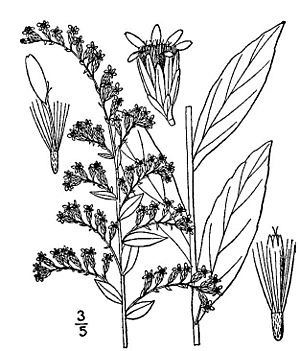Solidago latissimifolia facts for kids
Quick facts for kids Solidago latissimifolia |
|
|---|---|
 |
|
| 1913 illustration | |
| Scientific classification | |
| Genus: |
Solidago
|
| Species: |
latissimifolia
|
| Synonyms | |
|
Synonymy
Aster latissimifolius (Mill.) Kuntze
Dasiorima elliotii Raf. Solidago edisoniana Mack. Solidago elliottii Torr. & A. Gray Solidago elliptica Elliott Solidago elliptica Aiton Solidago mirabilis Small |
|
Elliott's goldenrod, also known as Solidago latissimifolia, is a beautiful flowering plant. It belongs to the sunflower family. This plant grows naturally along the Atlantic Coast of North America. You can find it from Nova Scotia in Canada all the way south to Alabama and Florida in the United States.
Contents
What is Elliott's Goldenrod?
Elliott's goldenrod is a type of perennial plant. This means it lives for more than two years. It can grow quite tall, sometimes reaching up to 4 meters (about 13 feet) high! The plant spreads using special underground stems called rhizomes. These rhizomes help new plants grow nearby.
Leaves and Flowers
The leaves of Elliott's goldenrod are shaped like an ellipse. They can be up to 15 centimeters (about 6 inches) long. When it blooms, one plant can produce as many as 800 small, bright yellow flowers. These flowers grow in large, branching groups at the very top of the stems.
Where Does It Grow?
This special goldenrod prefers to live in wet places. You can often find it in marshes. These marshes can have fresh water or slightly salty (brackish) water. It also grows in thickets, which are dense groups of shrubs or small trees, along the coastal plain.
Protecting Elliott's Goldenrod
It's important to protect plants like Elliott's goldenrod. Some places are working hard to keep this species safe.
Conservation Status in the United States
In some states, Elliott's goldenrod needs special attention:
- In New York, it is listed as an endangered species. This means it is at risk of disappearing completely.
- In Rhode Island, it is a species of special concern. This means it needs careful watching to make sure its numbers don't drop too low.
- In Connecticut, it is also a special concern. Scientists believe it might be extirpated there. This means it no longer grows naturally in Connecticut, even though it might still exist elsewhere.
Protecting these plants helps keep our natural world healthy and diverse.

